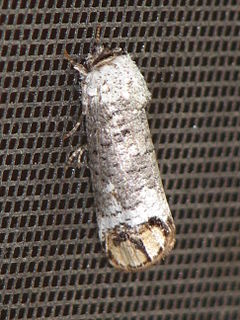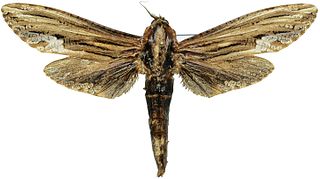Related Research Articles

The Cossidae, the cossid millers or carpenter millers, make up a family of mostly large miller moths. This family contains over 110 genera with almost 700 known species, and many more species await description. Carpenter millers are nocturnal Lepidoptera found worldwide, except the Southeast Asian subfamily Ratardinae, which is mostly active during the day.

Zeuzera is an Old World genus of moths belonging to the family Cossidae.
Prionoxystus piger, the baccharis carpenterworm moth, is a moth in the family Cossidae. It was described by Augustus Radcliffe Grote in 1865. It is found in Florida and Cuba.
Semagystia agilis is a moth in the family Cossidae. It was described by Hugo Theodor Christoph in 1884. It is found in Uzbekistan, Turkmenistan, Afghanistan and Iran.

The Zeuzerinae are a subfamily of the family Cossidae.

Endoxyla is a genus of moths in the family Cossidae.
Brachylia is a genus of moths in the family Cossidae.
Mirocossus is a genus of moths in the family Cossidae, described by J.W. Schoorl in 1990.

Chalcidica minea is a moth in the family Cossidae. It is found in India, Vietnam, Thailand, the Moluccas, Papua New Guinea, Queensland and on the Solomon Islands. The habitat consists of lowland rainforests.

Duomitus is a monotypic moth genus in the family Cossidae described by Arthur Gardiner Butler in 1880. Its only species, Duomitus ceramicus, described by Francis Walker in 1865, is found in Yunnan in China and from southern India and Malaysia to Sumatra, Ceram and New Guinea.
Lakshmia is a genus of moths in the family Cossidae endemic to southeast Asia.
Panau is a genus of moths in the family Cossidae.
Tarsozeuzera fuscipars is a moth in the family Cossidae. It was described by George Hampson in 1892. It is found in southern India, Malaysia, Borneo, Vietnam, Thailand and Yunnan, China.
Strigocossus capensis is a moth in the family Cossidae. It is found in the Democratic Republic of Congo, Kenya, Malawi, South Africa, Tanzania, Uganda and Zimbabwe.
Strigocossus cretacea is a moth in the family Cossidae. It is found in Madagascar.
Strigocossus moderata is a moth in the family Cossidae. It is found in Cameroon, Gabon, Kenya, Malawi, Mozambique, Sierra Leone, South Africa, Tanzania and Zambia.
Trismelasmos cinerosa is a moth in the family Cossidae. It was described by Roepke in 1955. It is found in New Guinea. The habitat consists of both lowland and mountainous areas.
Trismelasmos tectorius is a moth in the family Cossidae. It is found in New Guinea and on the Solomon Islands.

Endoxyla cinereus, the giant wood moth, is a moth in the family Cossidae. It is found in Australia and New Zealand.
Endoxyla vittata, the orange-lined wood moth, is a moth in the family Cossidae. It is found in Australia, where it has been recorded from Western Australia.
References
- ↑ Yakovlev, R.V., 2011: Catalogue of the Family Cossidae of the Old World. Neue Entomologische Nachrichten, 66: 1-129.
- Pitkin, Brian & Jenkins, Paul. "Search results Family: Arctiidae". Butterflies and Moths of the World. Natural History Museum, London.
| This article relating to the moth subfamily Zeuzerinae is a stub. You can help Wikipedia by expanding it. |